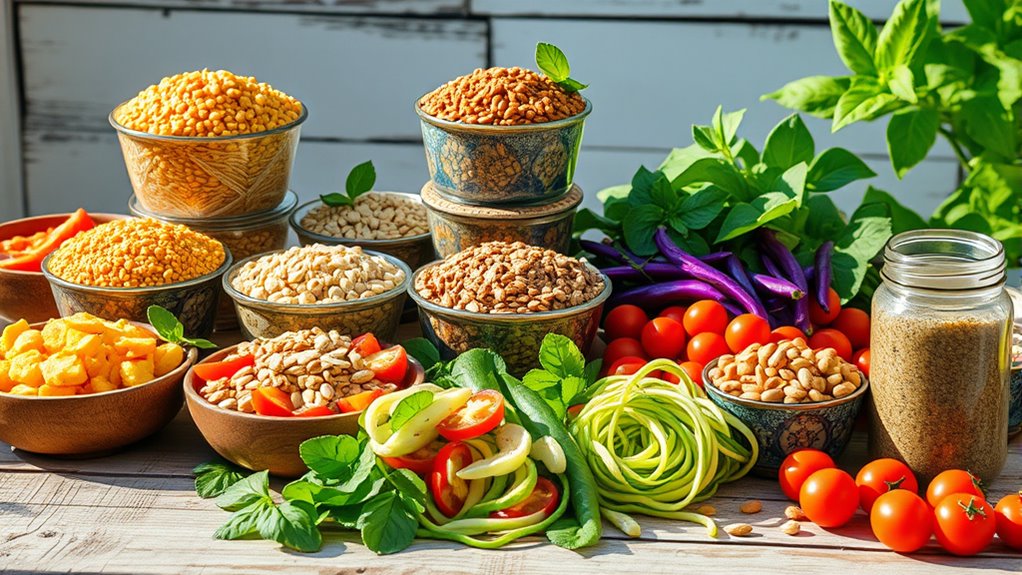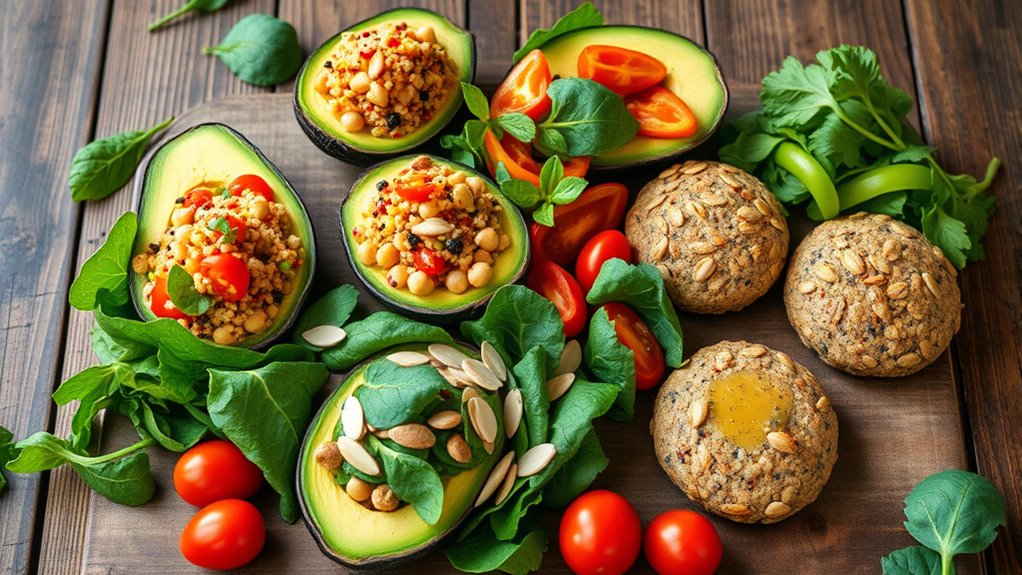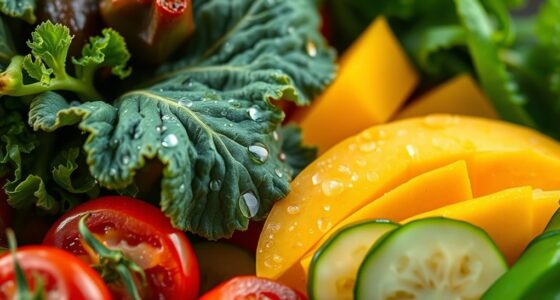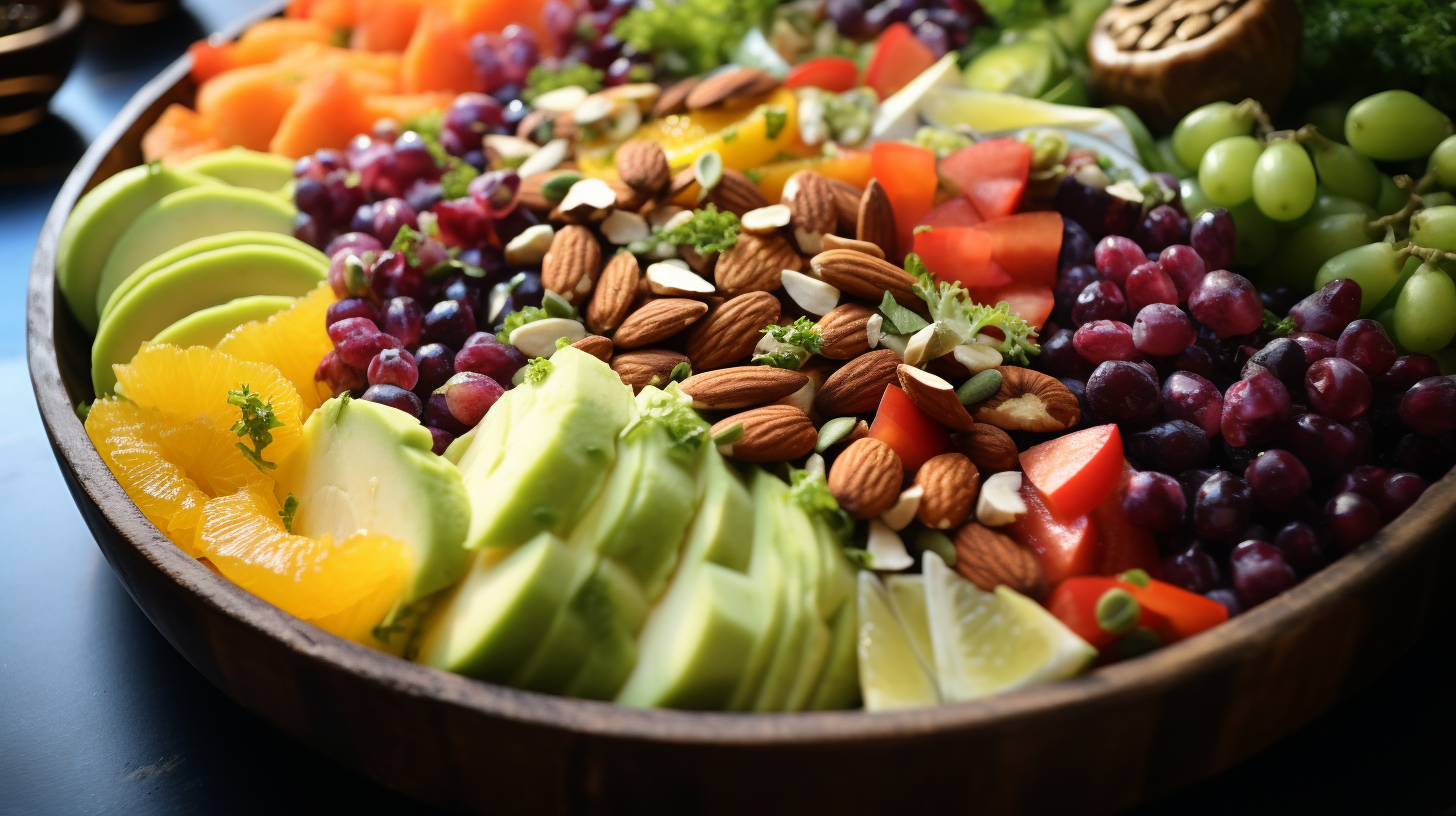Many believe raw vegan diets lack enough protein, but that’s a myth. You can meet your protein needs by including a variety of raw plant foods like nuts, seeds, sprouted grains, and leafy greens. Combining different sources throughout the day guarantees you get all essential amino acids. With proper planning and diverse choices, your raw vegan diet can easily support your protein requirements. Stay tuned to discover how to optimize your plant-based protein intake naturally.
Key Takeaways
- Raw plant foods like nuts, seeds, sprouted grains, and vegetables provide ample, complete protein when consumed in variety.
- Combining different raw plant sources throughout the day ensures all essential amino acids are met.
- Techniques like soaking and sprouting enhance digestibility and bioavailability of raw proteins.
- A diverse raw vegan diet naturally supplies sufficient protein without cooking or animal products.
- Proper planning and variety make it entirely possible to meet protein needs on a raw vegan diet.

Many believe that a raw vegan diet can’t provide enough protein, but this isn’t true. The idea stems from the misconception that animal products are the only reliable protein sources. In reality, you can get all the protein your body needs from plant-based sources that are raw and unprocessed. These foods, such as nuts, seeds, sprouted grains, and certain vegetables, are rich in protein and contain a diverse array of amino acids. While some worry about amino acid profiles— the specific building blocks that make up proteins— rest assured, by eating a variety of plant-based foods, you can easily meet your daily protein requirements.
Many raw vegans rely on a combination of foods like hemp seeds, chia seeds, sprouted lentils, and leafy greens to cover their protein needs. These sources aren’t just high in protein; they also provide essential amino acids that your body uses for muscle repair, immune function, and enzyme production. Although some plant-based sources may be lower in certain amino acids compared to animal products, combining different foods throughout the day helps ensure a complete amino acid profile. For example, eating nuts with seeds or sprouted grains with leafy greens creates a synergistic effect, providing all essential amino acids in adequate amounts.
You might worry that raw foods don’t pack enough protein because cooking often enhances digestibility and bioavailability. However, many raw plant-based sources are naturally rich in digestible proteins. Sprouting grains and legumes, for instance, breaks down anti-nutrients and increases their bioavailability, making their amino acids more accessible to your body. Plus, raw nuts and seeds are calorie-dense and packed with proteins, healthy fats, and micronutrients, making them excellent staples in your diet. Additionally, proper food preparation techniques like soaking and sprouting further improve nutrient absorption and digestibility. As long as you consume a variety of these sources, you’ll meet your daily protein needs without relying on cooked or processed foods.
In short, a well-planned raw vegan diet can absolutely provide sufficient protein. It’s all about diversity— incorporating different plant-based sources ensures you get a complete amino acid profile. You don’t need to compromise on your dietary principles or nutritional needs; nature has already provided you with a vast array of raw, protein-rich foods that can support your health and vitality. With careful planning, you’ll discover that the myth of insufficient protein on a raw vegan diet simply doesn’t hold up.
Frequently Asked Questions
How Do Raw Vegans Meet Their Daily Protein Requirements?
You meet your daily protein requirements on a raw vegan diet by consuming a variety of plant-based foods rich in protein, which promotes better protein absorption and amino acid diversity. Incorporate nuts, seeds, sprouted grains, and leafy greens to guarantee you’re getting all essential amino acids. This diversity helps optimize nutrient absorption and supports your overall health, making it easier than you might think to meet your protein needs naturally.
Are There Specific Raw Vegan Foods High in Protein?
You can find raw vegan foods high in protein, which provide essential plant-based amino acids and support good protein quality. Foods like sprouted seeds, nuts, and legumes are excellent sources. Incorporate a variety of these to guarantee you’re getting all necessary amino acids. This approach helps meet your daily protein needs naturally, proving that a raw vegan diet can be both balanced and nutritious without sacrificing quality.
Can Raw Vegan Diets Support Athletic Performance?
Think of a raw vegan diet as a lush, vibrant garden where athletic performance can flourish. Contrary to plant-based myths and dietary myths, you can fuel your body with raw, nutrient-dense foods that support strength and endurance. Fresh fruits, nuts, seeds, and sprouted greens provide ample energy and recovery aid. With proper planning, your raw vegan lifestyle can power your athletic goals just as effectively as any traditional diet.
What Are Common Protein Deficiency Symptoms in Raw Vegans?
If you’re concerned about protein deficiency, watch for symptoms like fatigue, muscle weakness, or slowed recovery. Your body’s ability for protein absorption relies on consuming diverse plant-based amino acids, which raw vegan diets can provide. Ensuring you include a variety of nuts, seeds, and leafy greens helps meet your protein needs. By paying attention to these signs and maintaining a balanced intake, you support your overall health and muscle function effectively.
How Does Raw Vegan Protein Intake Compare to Cooked Diets?
Powerful proteins propel raw vegans past processed diets, providing peak protein absorption and pristine amino acid profiles. You can confidently consume raw foods, knowing they deliver essential nutrients efficiently. Unlike cooked diets, raw meals preserve enzymes that enhance digestion, maximizing amino acid absorption. This dynamic duo of raw foods and natural nutrients ensures you meet your protein needs, proving that raw vegan diets can support strength, stamina, and overall health effortlessly.
Conclusion
So, next time someone claims you’ll starve without steak, just remind them that raw vegan diets are packed with protein. It’s almost like they forgot plants can be powerful protein sources—who knew? With a little planning, you’re not just surviving; you’re thriving on greens and nuts. So go ahead, prove the skeptics wrong—who needs meat when you’ve got nature’s hidden protein treasures right on your plate?










